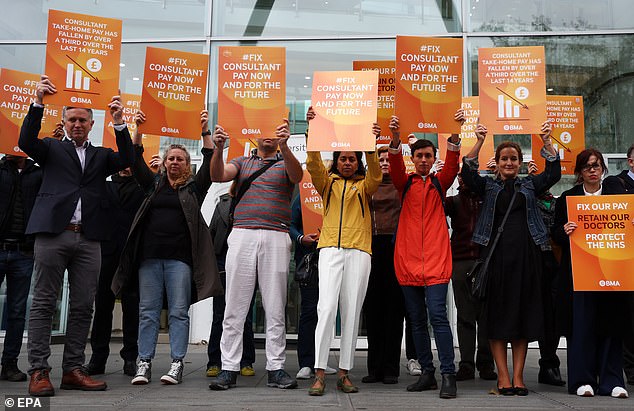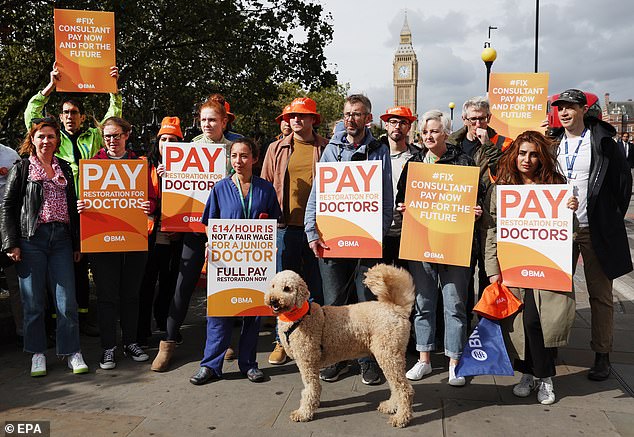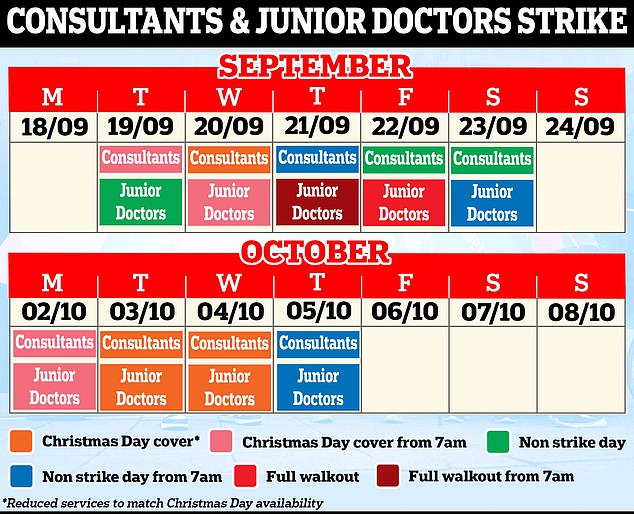Never-ending NHS strikes force hospitals to cancel ‘more than a MILLION appointments’
A million NHS appointments have now been canceled due to ‘damaging and demoralising’ strikes, figures are expected to confirm today.
It is believed that a walkout of doctors and consultants in England last week saw more than 100,000 consultations postponed.
The toll comes on top of the 885,000 appointments that have already been cut since the unions began their crusade for better wages last December.
Health chiefs say the reality will be much worse than official figures show, as trusts pre-emptively stopped booking appointments on strike days.
NHS Providers, which represents hospitals, warned that bosses are ‘incredibly concerned’ about the threat of strikes lasting into winter, when struggling hospitals are under intense pressure from the threat of seasonal diseases.
Official data released today shows that strikes by consultants and trainee doctors last week, including a one-day joint strike, led to 133,494 routine procedures and appointments having to be rescheduled. This brings the total number of canceled appointments to 1,018,648

NHS consultants carry signs as they attack a picket outside University College Hospital in London on September 19
Consultants – who earn an average six-figure salary – stood on the picket lines for 48 hours last week, overlapping with trainee doctors who staged a 72-hour strike.
This ensured that patients in hospitals had ‘Christmas Day’ cover, with emergency departments staffed and basic cover on the wards.
Further joint action by both groups of doctors is planned for next week.
As a result, health leaders have told patients to expect five ‘Christmas Days’ in the coming weeks as a result of further strikes. Most non-urgent care has been canceled on these dates, despite efforts to tackle the record backlog built up during Covid-19.
So far this year, trainee doctors have held 22 days of strike action, with consultants taking to the picket lines on six separate days.
Many routine hospital appointments and treatments, including cancer care, have been postponed due to industrial action, which is being coordinated by the British Medical Association (BMA).
The union states that the doctors Wages have eroded over the past fifteen years. It has made a demand A 35 percent pay increase, while consultants, who are in the top two percent of earners in the country, have set their pay claim at 11 percent.
However, the government said their pay offer – which is between six and 10 percent depending on the staff group and their level of experience – is final.
Saffron Cordery, deputy chief executive of NHS Providers, said: ‘How bad does it have to get before we see an end to these damaging and demoralizing industrial disputes?
“Immediate care must go to patients – more than a million and counting – whose care or treatment has been postponed.
‘Trust leaders understand all too well the suffering this can cause them and their loved ones. Every effort has been made to cushion the impact of the successive strikes, but rising disruption figures only tell a small part of the story.
‘With the official figures on procedures and appointments that we know have been rescheduled, thousands more patients will be affected as trusts simply do not book care for strike days that are known well in advance.
“There are real and human costs behind every delay. How many more reasons are needed to end the dispute?’
Monika Schiffer, a cancer survivor from Bournemouth, told MailOnline that her double mastectomy had been canceled due to strikes.
She said: ‘I think it’s a scandal that the NHS is allowed to go on strike. I would ban all emergency services – police, fire and the NHS – from taking industrial action. They are playing with people’s lives.’
Meanwhile, a mother told how she feared her daughter could lose her sight after her crucial eye surgery was canceled for a third time due to NHS strikes.
Patsi Whelan Archer said her daughter had to undergo surgery last week to treat cataracts in both eyes and replace the battery on a potentially life-saving anti-epileptic drug. But it was canceled because of to action by doctors in training.
And Fiona Chapman, from Wadebridge, Cornwall, said her husband’s procedure for crippling migraines had been canceled twice due to strikes by NHS medics.
Ms Cordery told Sky News that resolving the dispute will help reduce the waiting list.
She said: ‘I think the crucial point here… is that it is absolutely within the gift of the government and of the union to come around the table, have the conversations and resolve the strike action.
“If we resolve the strike action, we will be in a position where we can start to reduce the waiting list.

Pictured: NHS consultants and trainee doctors carry signs as they strike outside St Thomas’ Hospital in London on September 20

Consultants in England have joined the picket lines on four separate days so far this summer, while junior doctors have staged 19 days of strike action this year. Both will return to the picket lines together on October 2, 3 and 4. Radiographers will also join medics in walking out for 24 hours from 8am on October 3.
‘Because we know that hospital trusts and other healthcare organizations are working at double speed, whenever they can, to get people through, get their appointments, do their operations and solve their problems.’
Asked about the possibility of strikes going into the winter, she added: ‘(We are) incredibly concerned if we see industrial action continuing into the winter.
‘We know that winter is an extremely difficult time. It has become more difficult because of the risk of Covid and Covid outbreaks, in addition to flu and other respiratory illnesses exacerbated by the weather.
‘But if we add industrial action on top of that, especially the industrial action we saw last week, with trainee doctors and consultants striking together, then we know that we are in for a very difficult time and what we know is that patients and staff and the public deserve more.’
Professor Phil Banfield, chairman of the BMA, said the union “extremely regrets that it has come to this” but said strikes are necessary to ensure there are “trained doctors in the area to care for all patients in the future.” to care’.
He said: ‘It is the doctors, with their skills and expertise, who have continued to treat patients despite years of relative wage erosion, a pandemic that has been a brutal experience for doctors, nurses and other carers – as well as so many families – and the challenges in dealing with the worst waiting lists in the history of the NHS, which have affected patient care for the past decade and more.
“It is the government choosing not to recognize the cost and value of medical care; it is in their hands to secure the retention and recruitment of doctors in the NHS for years to come.
‘The longer the government burys its head in the sand, the more strikes and waiting lists cost the public purse.
‘It’s a no-brainer to invest in the future of NHS workers rather than waste more money by refusing to make a credible pay offer.
‘Our door has been open for over a year and we hope for the sake of our patients that the government will eventually listen.’
A Department of Health and Social Care spokesperson said: ‘The coordinated action next week will cause further unacceptable disruption to patients and fellow NHS staff.
‘We have fully accepted the recommendations of the independent pay review body, which means doctors who started their hospital training this year will receive a 10.3 per cent pay increase, while the average trainee doctor will receive 8.8 per cent.
‘Consultants will receive a 6 percent pay increase and are already among the top 2 percent of earners in the country.
“This award is final, and the majority of unions representing more than a million other NHS workers have accepted our offer and called off further strike action.
‘The Secretary of State for Health and Social Care is clear that his door is open to discuss non-payment issues if the BMA puts an end to this damaging disruption.’
